Jul 2017 2nd Edition
Jul 2017 2nd Edition Estelle Greeff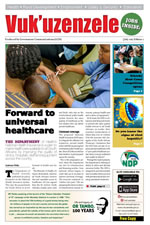
Translations
Forward to universal healthcare
Forward to universal healthcare LondekileThe Department of Health’s National Health Insurance is a plan to make healthcare available to all South Africans by improving the quality of clinics, hospitals, staff and equipment across the country.
The Department of Health recently published its policy document on the National Health Insurance system. This lays the groundwork for South Africa to move forward to health care for all.
The Minister of Health, Dr Aaron Motsoaledi, believes all South Africans deserve free and equitable access to healthcare. He has argued that the 45 million South Africans, mainly poor, rural and black, who rely on the overburdened public health system deserve the same quality of healthcare as fellow citizens who can afford private healthcare. 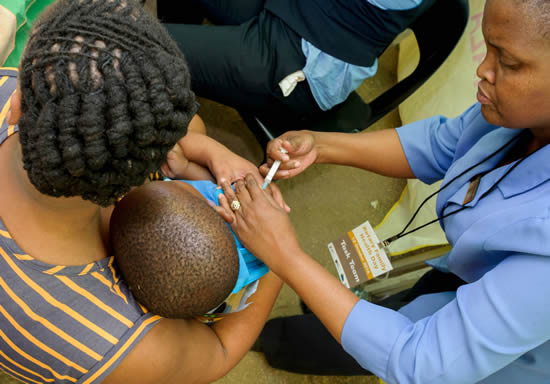
Universal coverage
The proposed National Health Insurance (NHI) aims to integrate the efficient, but expensive, private health sector with the improving but overloaded public health system. Since 2011 this model has been tested in 11 pilot projects across the country.
This is the preparation period, when the department can test its infrastructure and financing models. Once national rollout begins, it could take up to 14 years to achieve universal coverage. The minister explained in October last year: “We are preparing the clinics in terms of infrastructure, human resources, primary health care and in terms of equipment.”
At its heart, the NHI is a finance model that pools funds to provide the same quality health services to all South Africans no matter their economic circumstances or where they live. In October 2016 the minister told delegates at the South African Pharmacy Conference that the NHI does not aim to replace private healthcare with a “poor public healthcare system that is corrupt, inefficient and unable to deliver”.
Through the 11 pilot projects, the department is refining its ability to utilise and allocate resources better. The NHI is designed to provide essential care no matter where you live with private medical aids covering specialised treatment.
“We know you cannot have sound economic growth without a good healthcare system,” the Minister said. “You cannot end poverty, unemployment and inequality with poor healthcare systems.”
Pilot project achievements
Since 2011 all districts have raised the quality of their healthcare services and facilities to meet standards set by the national department.
Pilot projects have made it easier to identify shortages of specialists and helped to develop systems to identify shortages before they become critical. This has allowed National Treasury to build better funding models for the whole programme.
The quality of maternal, neonatal and child services have been raised. In the pilot districts, for example, 95 per cent of targeted girls have received the HPV vaccine.
In nine pilot districts, the department has funded a minimum of 180 000 GP clinic hours. This is equal to two million doctors’ visits or one million people having access to primary healthcare.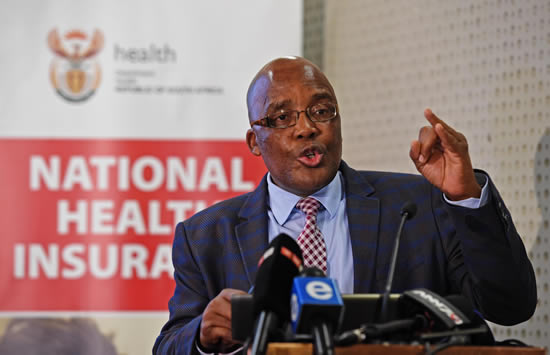
Some 38 000 patients have benefitted from the Central Chronic Medicines Dispensing and Distribution Programme, developed and being tested in the pilot areas. It reduces shortages of medication and cuts down waiting time for medicines at clinics.
E-Health initiatives that have been tested or developed for the programme include the Health Patient Registration System, which standardises patient registration across all health facilities using ID numbers as unique patient identifiers.
Integrated school health
The NHI includes basic health outreach services like the Integrated School Health programme (ISHP). At the end of 2016 at least 80 per cent of school health teams had begun working in pilot areas. These teams work between districts, including those not included in the pilot programme.
In one six month period the ISHP teams identified 54 238 children with health-related leaning disorders. Learning difficulties were picked up by optometrists, speech therapists and hearing therapists.
The Ideal Clinic
As part of NHI planning, the department has developed its Ideal Clinic Initiative. It sets standards in healthcare and staffing, sets levels for equipment and offers a standardised package of services to patients, who are treated with dignity.
- Ideal Clinics will offer community-based health promotion and disease prevention programmes.
- They are adequately staffed to reduce waiting times.
- They offer a comprehensive package of health services based on each community’s needs.
- They have basic necessities available – including chronic medication – and are able to refer patients to higher levels of care in good time.
- They have automated health information systems.
- They have developed alternative sites for medicine distribution.
At the end of 2016, 1 068 of 3 507 clinics in the pilot projects were characterised as Ideal Clinics.
Nurturing scientific, entrepreneurial talent
Nurturing scientific, entrepreneurial talent LondekileYoung South Africans are being urged ‘to embrace technology’ and become innovators who create jobs.
Speaking at the recent Youth in Science, Technology and Innovation Indaba, Minister of Science and Technology Naledi Pandor explained that future growth depended on embracing new technologies and innovation.
“With the unprecedented growth in many tech sectors, in particular mobile and information and communication technology, there has never been a better time in history for young South Africans to develop solutions that can address a range of challenges.”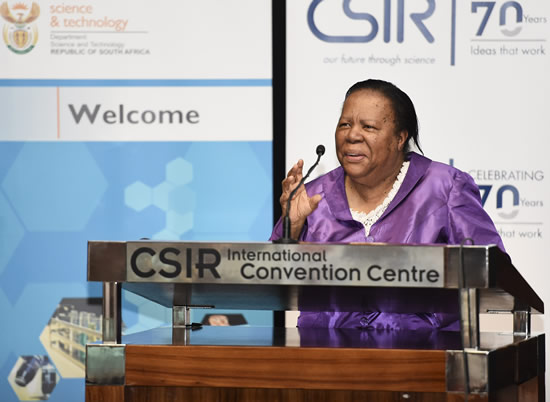
She said that as long as we embrace technology and nurture the scientific and entrepreneurial talent in the country, South Africa and Africa would have a bright future. The minister went on to say that it would be those innovators who would create the jobs the country needs to build an inclusive and equal economy.
However, to build on the growth inspired by technology, South Africa needs young people to play their part. Minister Pandor said, “One of the things we must do is to get many more young people to study and pass mathematics and science.”
Opportunities available
Eighteen-year-old Shane Ndzinga attended the Indaba, held at the CSIR (Council for Scientific and Industial Research) campus in the City of Tshwane, because of his lifelong interest in science. He was hoping that he would meet people who could help make his dream of becoming a scientist come true. “I’m looking for information on where to study and what to study. I find science and technology very fascinating and hope one day I will be one of South Africa’s top scientists,” he said.
Ndzinga was among the 300 young people attending who were given information on the 34 new science hubs built by the department and got to speak to representatives from companies involved in the Top 100 internship programme.
The inaugural two-day event targeted young entrepreneurs, grassroots innovators, captains of industry and youth in higher education. The minister told the younger audience members they needed to emulate the entrepreneurs and business people they would meet because they had all made contributions to the tech world, had started their own companies or had embraced technology to make the world better.
Make every day a Mandela Day!
Make every day a Mandela Day! Londekile
South Africa prides itself on being a country with a renowned democratic culture of engagement and negotiation.
South Africans pride themselves on robust and healthy debate, critical dialogue and exchange and a history of resolving seemingly intractable problems by coming together as one nation towards a common goal.
This was the case at the Convention for a Democratic South Africa (Codesa) negotiations, which resulted in a democratic breakthrough, the first democratic elections in 1994, and inauguration of the formidable President Nelson Mandela.
In July we join the world in celebrating Mandela Day. On Madiba’s birthday, 18 July, South Africans engage in various activities aimed at promoting good deeds in the service of mankind, as taught by Madiba. We will be celebrating his life and also his contribution to the struggle for liberation and transition to a democratic South Africa. South Africa is truly proud to have produced a leader of Madiba’s calibre. We urge all our people to find something good to do on the 18th of July, such as helping the less fortunate or contributing to making our country a better place in various ways.
What can we do?
Many people will be cleaning schools, visiting old age homes and orphanages and helping the homeless. Young people should consider cleaning their surroundings as well, removing garbage from our streets and ensuring that we live in cleaner communities of which we can be proud.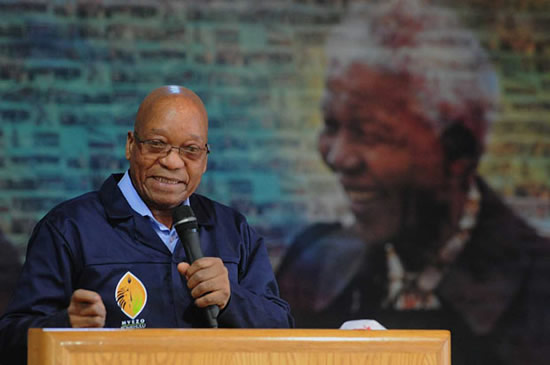
In remembering Madiba let us also work harder to make our communities safer, and join the police in fighting crime. We should also work together to end the scourge of violence against women. We receive too many reports of brutal murders of women in the country. This must stop. We urge women to report abuse early enough before it becomes too late. We urge family members as well to report abuse to the police and not treat it as a “domestic matter”. No woman must be beaten or abused in any manner by anyone including intimate partners including husbands.
We also need to make the streets safer for women and girls. If they go to the shops to buy bread, they should be safe and not at risk of being attacked or raped. Madiba, Walter Sisulu, Oliver Tambo, Lillian Ngoyi, Helen Joseph and many others spent their lives fighting for a South Africa in which all would feel safe and be respected. Let us build safer communities in their memory. Government has declared violence against women and against children as priority crimes. The police have been directed to treat these cases as priorities and to not turn away any woman who comes to report abuse or attacks.
In the month of August, Women’s Month, we should all engage in campaigns that send a strong message that South Africa must be safe for women and children.
Seeking solutions together
As our readers are aware, the country has entered a technical recession, which means a great deal of difficulty for everyone. At the time of the delivery of the national Budget speech in February, the economy was expected to grow at a low 1.3 per cent in 2017. Given the current difficulties, even this low growth rate may not be achieved now. The economy needs to grow so that it can create much-needed jobs. We need to build confidence in the economy, which we can only do by working together as ordinary South Africans, business, government, labour and other sectors.
We will be dipping into these collective resources as a country as we seek solutions to perhaps the most difficult economic period in South Africa since 1994.
Last week, I convened a special meeting of the Economic Sectors, Employment and Infrastructure Development Cluster Ministers, otherwise known as the Economic Cluster of Ministers, in Pretoria to consider and discuss the current economic challenges facing South Africa. We will also be meeting with the business community so that together we can use our collective wisdom to find ways of getting our country out of this difficulty.
We emphasise that in all these endeavours South Africans have the capacity to rise collectively above difficulties and work together to find solutions to problems facing the country.
It is in this spirit that we will continue to work with all sectors to seek solutions that will take our country and its people out of the current economic difficulties into a better South Africa.
We wish all South Africans a happy Madiba Month. Let us strive to make every day a Mandela Day.
Champions of the project include:
Champions of the project include: lebangTelkom, MTN, Microsoft, Qualcomm, Intel Corporation, Boston Consulting Group, Digital Opportunity Trust, Cisco, DBSA, Neotel/Liquid Telecom, African Development Bank, the United Kingdom Department for International Development, the World Bank, Vodacom, Cell C, Google, Ericsson, Accenture, Altron, the Industrial Development Corporation, SoEs, ICT SMMEs, Research ICT Africa, Ndlovukazi Online Media and WEF Global Shapers.
Gauteng looking to impact township businesses
Gauteng looking to impact township businesses LondekileLocal government
The Gauteng government has spelt out a number of plans to create 600 000 jobs in the next two years and to boost township economies.
Gauteng MEC for Economic Development, Environmental Affairs and Agriculture Lebogang Maile unveiled his department’s 2017/2018 budget recently. It spells out plans to grow township and rural Gauteng economies through public procurement and grow the province’s knowledge-based economy.
His department is in a key position to create jobs and stimulate the economy.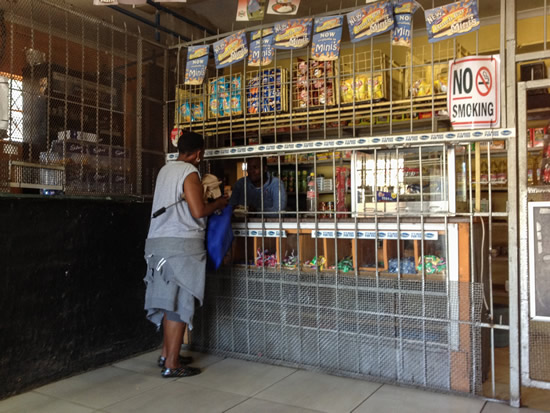
The MEC added that the provincial economy needed to create 600 000 jobs by 2019 just to keep up with the number of new job seekers. Most of that growth is expected to take place in townships, and the province’s economic development budget reflects that.
In townships
The province’s recently adopted Economic Development Plan will not only guide policy toward that end, but also help break bottlenecks in the manufacturing and service sectors.
Over the past three years, one of the province’s successes was its Qondisa iShishini lakho! (Fix Your Business!) campaign.
Through roadshows and township visits, the campaign has helped register 7 000 previously informal township businesses. They now qualify for financing, investment, training and business advisory services through government agencies.
Working through the Gauteng Economic Propeller, the Gauteng Informal Business Upliftment Strategy will continue to formalise informal township businesses. “We are now spending more than R6 billion [on township businesses] but it’s still not enough. We want to spend at least 30 per cent of our budget by 2019.”
Training future business leaders
The province will establish a Township Local Producer and Wholesale site to assist 100 local producers to enter the retail sector. The site will also incubate businesses, help with registration and act as a retail space for them.
In addition, the Construction Eco-System Centre will focus on developing the skills of township contractors. Between now and 2019, up to 50 developers will receive skills training and be tutored in how to run their business.
A three-year incubation project, Incubation of Automotive Sector Informal Businesses, will concentrate on training 75 backyard mechanics. They will be given training and on completion, will receive equipment and be accredited to service provincial and local municipality fleets.
Working with the private sector, the province has identified 150 black industrialists who will be mentored to run their own mining, construction and agricultural equipment manufacturing companies.
These programmes, along with the development of five industrial sites, are intended to boost Gauteng’s township economies.
The sites earmarked for development are:
• Pennyville Industrial Park Phase 2 and Alexandra ICT Phase 2 in the Central corridor
• Khutsong South Industrial and Chamdor in the Western corridor
• Vosloorus Industrial Park Phase 2 in the Eastern corridor
Contact: Qondisa iShishini lakho! Fix your business! Regmaak jou besigheid!
E-mail: gdedenquiries@gauteng.gov.za
Cell: 087 943 7170
Gauteng Economic Propeller:
E-mail: enquiries@gep.co.za
Tel: 011 085 2000
Free services for the poorest
Free services for the poorest LondekileLocal government
Municipal policies help alleviate poverty by providing free basic services to people unable to support themselves. The poorest households – the unemployed, people living on grants and children – benefit from free water, electricity, sewage and sanitation services.
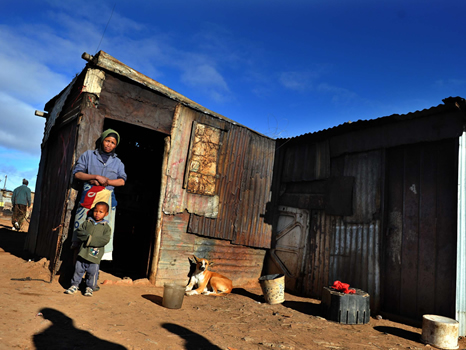 To access these services, known as Expanded Social Packages, households have to register with their municipality. Child-headed households automatically qualify, and people receiving social grants will require a means test.
To access these services, known as Expanded Social Packages, households have to register with their municipality. Child-headed households automatically qualify, and people receiving social grants will require a means test.
To register, you need to provide documents showing:
- Monthly income of the household is not more than two state pensions.
- You do not own any other property besides your residence.
- You must be at least 18 years old and a South African citizen.
After submitting the documents, you will be visited by municipal employees and a social worker for an assessment.
Households are entitled to:
- 6 000 litres of water per household of eight people per month
- 50 kWh of electricity per month
- Basic sanitation services
Municipalities have developed strategies to help households made up of the poorest of the poor – known as “indigent households” – rise out of poverty. In Tshwane, for example, this works in seven ways:
- Skills, life skills and financial literacy training
- Employment referral service
- Strategic small business investments
- Households on the Indigent Register have to commit to working on projects in their community
- Airtime subsidies, communications conduits and SMS coaching
- Intensifying the role of social workers
- Rethinking procurement for household services to favour small-scale cooperatives and community-based entrepreneurs
This is a general list of documents you need to apply for a municipal Expanded Social Package Programme:
- Certified copy of the applicant’s ID, as well as all dependants. For children, a birth certificate, school report or a letter from the school is acceptable.
- Proof of income or an affidavit if unemployed.
- The latest municipal account.
- You will be required to sign a declaration allowing the municipality to share your information with other departments and provide fingerprints.
- Benefits are dependent on which of the three poverty bands you fall into. Three is for the poorest, who may receive subsidies on water, electricity, rates sanitation, refuse, rent and travel.
Schools Moot Court Competition opens
Schools Moot Court Competition opens LondekileIt is that time of the year again when all secondary schools are invited to enter the National Schools Moot Court Competition.
Now in its seventh year, the moot court competition aims to encourage young South Africans, especially those in Grades 10 and 11, to understand and relate to human rights concepts, values and principles.
The first National Schools Moot Court Competition took place at the Constitutional Court in Johannesburg on 21 March 2011, Human Rights Day. Teams from four schools in each of the nine provinces – a total of 72 learners – were selected to participate.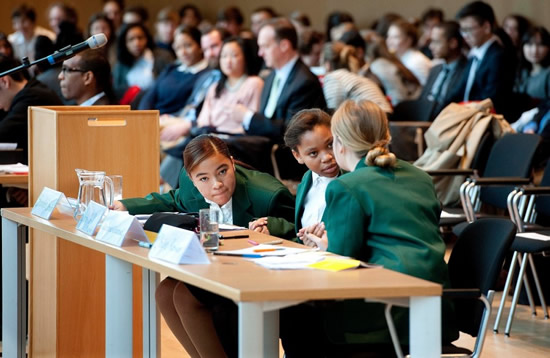
The competition also aims to empower learners and encourage those from previously disadvantaged schools to pursue careers in law. “It is these young people who will lead meaningful dialogues on the Constitution and craft legislation and policies that will guide our country in the future,” Deputy Minister of Justice and Constitutional Development John Jeffery noted during last year’s event.
Defending human rights
Participating teams are provided with the facts of a fictitious case which involves human rights issues under the South African Constitution. The teams are expected to write two short essays defending opposite sides of the case. The teams from each province with the highest essay scores will be invited to argue the case in an oral round before judges in a real court scenario.
The final oral round is hosted at the Constitutional Court in Johannesburg. Winners will receive financial support toward their first year of study at any South African university to which they have been admitted – should they choose to study law.
The eight finalists in the national oral round will stand a chance to represent South Africa in The Hague at the International Moot Court Competition in January 2018.
The South African competition is a partnership between the University of Pretoria’s Faculty of Law, the Department of Justice and Constitutional Development, the Department of Basic Education, the Foundation for Human Rights, Cliffe Dekker Hofmeyr and Webber Wentzel.
How to participate in the 2017 moot court competition
Step 1
Each school must select a team of two learners, preferably one male and one female. This is only a preference, not a requirement.
Step 2
Download the competition material (Hypothetical Fact, Resource Pack & Competition Rules). You can download the “Essay Writing Guide” and the “Oral Pleading Guide” to assist with your preparations.
Step 3
Team members must write one essay for the Applicant and one essay for the Respondent.
In total, teams must write two essays. Submit both essays before the submission deadline (28 July 2017 at 5pm). Teams can submit essays to schoolsmoot@up.ac.za. A moderate extension will be given to schools if sufficiently warranted.
Step 4
The 10 teams in each province that wrote the best essays (based on the essay results) will be invited to participate in the provincial oral rounds taking place between 19 August and 2 September 2017.
Note that the provincial oral rounds are organised by the provincial departments of Basic Education and the Department of Justice and Constitutional Development.
Judges from the provincial oral rounds will select the four best teams from each province. Those teams will advance to the national oral round in Pretoria and Johannesburg to be held from 4 to 8 October 2017 (refer to the 2017 Official Rules).
Step 5
In Pretoria, the four best teams from each province will compete against each other through the preliminary, quarter-final, semi-final and the final rounds.
The grand finale oral round will be hosted in the Constitutional Court in Johannesburg on 8 October 2017.
Step 6
Like the National Schools Moot Court Competition on Facebook.
For more information on the competition, visit www.schoolsmoot.co.za.
For any questions or queries, contact Gift Kgomosotho on schoolsmoot@up.ac.za or call 012 420 5883.
Sinenhlanhla Mkhwanazi is a media research and liaison officer with the Department of Justice and Constitutional Development
City of Joburg launches safety campaign
City of Joburg launches safety campaign LondekileThe City of Johannesburg and UJ are teaching students how to defend themselves.
With the recent rise in incidents of women being kidnapped and killed across the country, the City of Johannesburg has partnered with the University of Johannesburg to introduce self-defence classes to students on campus.
The aim is to empower students with techniques to defend themselves.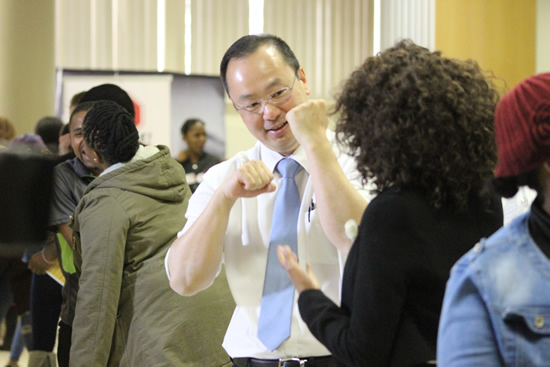
The Women’s Safety Campaign was launched by City of Johannesburg Public Safety MMC Michael Sun after receiving complaints from female students at the university about safety.
The complaints followed the death of Karabo Mokoena, who was allegedly killed and set alight by her ex-boyfriend, and the case of three women whose bodies were discovered in and around Naledi in Soweto.
“We are aware of what has been happening throughout the country and it really is a cause for concern.
“It worries us that people, particularly women are being targeted, abducted and killed,” said the City of Johannesburg’s stakeholder manager and spokesperson in the office of public safety, Luyanda Longwe.
“It is because of this and other factors that we continue to urge students to always be vigilant and to not walk alone, but in groups, because it makes it harder to become a target.”
He added that people should not accept lifts from strangers and should always tell someone about their travel plans.
“It makes it easier for them to know approximately when you should arrive at your destination,” said Longwe.
In addition to the self-defence classes, which show people how to throw a punch or two when defending themselves, educational material is also handed out with distress whistles.
The 30-minute lessons were given by a martial arts specialist from the University of Johannesburg.
Student Lungile Maseko said the lessons were much-needed. “The lessons have restored some sense of safety and security among us as students and that’s what we wanted.”
The University of Johannesburg’s senior lecturer at the Department of Strategic Communications Dr Corne Davis said such efforts would be strengthened at the university, as safety was paramount for everyone on campus.
Preparing for final exams
Preparing for final exams lebangThe Northern Cape’s winter school camps held recently gave the province’s matriculants an opportunity to be better prepared for the rest of the school year.
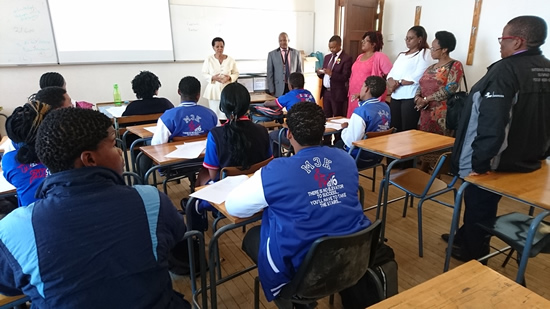 Beginning with a test, the Northern Cape’s winter school camps set each learner’s level for multiple subjects before the extra classes began. Spread across eight residential camps and 17 day schools, the camps gave the Class of 2017 the opportunity to revise work they had done in class and get to grips with subjects they were struggling with.
Beginning with a test, the Northern Cape’s winter school camps set each learner’s level for multiple subjects before the extra classes began. Spread across eight residential camps and 17 day schools, the camps gave the Class of 2017 the opportunity to revise work they had done in class and get to grips with subjects they were struggling with.
Martha Bartlett, Northern Cape MEC for Education, believes the camps will help to improve the province’s pass rate. “We do believe that the Class of 2016 provided us with the perfect stepping stone to further improve the success rate of our learners. We will continue to invest into the future of all our children until every child succeeds.”
Improving on success
The camps follow April’s autumn camps and are part of the province’s campaign to help determined learners and to supplement the school programme. “This is our commitment to our learners and the people of the province to improve the overall learner performance and the quality of education in the Northern Cape.”
The winter school camps focused on English first additional language, Afrikaans home language, mathematics, mathematical literacy, agricultural science, life sciences, physical science, accounting, business studies, economics, history and geography. At the end of the week, the participants were tested on the work that was covered.
The camps offer structured revision and help with homework over the course of a week. Bartlett believes this will lead to a better pass rate at the end of the year.
The programme will resume during the spring holidays. “We are geared up and have confidence in our education system as we provide continuous support and guidance to the Class of 2017. We will also conduct visits to underperforming schools weekly.”
Bartlett says the programme was designed to give learners confidence going into their final exams. She also hoped the study groups formed through the week would continue away from the camps.
She provided a few pointers for the learners ahead of the exam season. “Be focused on your studies and believe in your abilities, work out a clear study programme in preparation for the examinations, manage your time well and maintain a calm state of mind.”
Ekurhuleni schools to share resources
Ekurhuleni schools to share resources lebangThe twinning of township and suburban schools is aimed at breaking the racial design behind schools and putting education on a more equal footing.
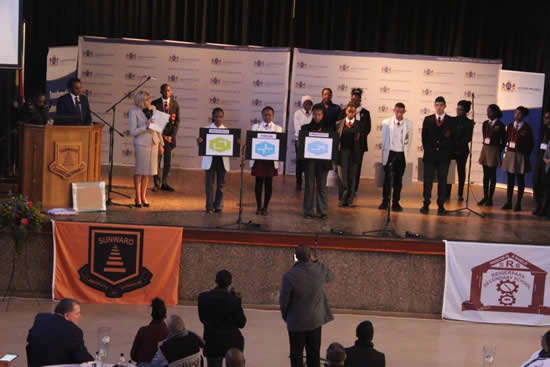 The Gauteng Department of Education has twinned another two schools, Reiger Park Secondary and Sunward Park High in Ekurhuleni, to allow the sharing of resources.
The Gauteng Department of Education has twinned another two schools, Reiger Park Secondary and Sunward Park High in Ekurhuleni, to allow the sharing of resources.
It is hoped that this will improve learner outcomes. The twinning programme focuses on the sharing of resources between suburban schools and township schools, with the ultimate goal of ensuring that no school is left needing resources when a school nearby can help meet specific resource needs.
According to the Gauteng Department of Education spokesperson, Oupa Bodibe, the move will also ensure that learners are exposed to peers from diverse socio-economic backgrounds and improved access to high quality education.
“We want to make sure that schools share resources and that no school is deprived of giving its learners the best, owing to a shortage of resources.”
Although a bit of resistance was experienced in the beginning, educators and pupils at both schools have come to welcome the changes and feel that this will ensure that pupils are placed on an equal footing where education is concerned.
So far, Bovet Primary and Lyndhurst Primary School; and Alexandra Secondary and Sandown High School have also been twinned.
The department has also dispelled rumours that twinned schools will share funds. Regulations have been published for School Governing Bodies to ensure that the administrative aspects in relation to the management of finances are retained by each school.
Sandown High School learner Tshiamo Kungwane said that pupils are thrilled with the move.
“It is truly a great opportunity for both schools and what excites me the most is the fact that we will be able to share resources and will be in a position to assist each other in future.”
War on germs at schools
War on germs at schools lebangA public-private partnership between the national Department of Education and Unilever aims to teach healthy hygiene habits to South African learners.
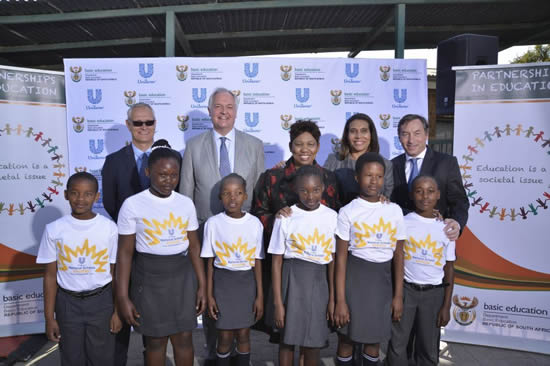 School children across the country are being encouraged to adopt healthy and hygienic habits.
School children across the country are being encouraged to adopt healthy and hygienic habits.
The Department of Basic Education (DBE), in partnership with Unilever, officially launched the Unilever National Schools Hygiene and Sanitation Programme at Skeen Primary School in Alexandra recently.
The signing of a memorandum of understanding cemented a five-year partnership between the department and Unilever that will promote improved hygiene and sanitation habits in schools.
It encourages learners to wash their hands before eating, brush their teeth daily and adopt a healthy lifestyle.
The programme involves a 21-day in-class behavioural change campaign, the Proven 21-day Behaviour Change Model, as well as the provision of soap, toothpaste and toothbrushes to 15 000 public primary schools in all nine provinces from September 2017. Products will be provided by Domestos, Mentadent and Lifebuoy.
The programme is further aimed at decreasing preventable infections in learners, thereby improving school attendance.
Lifebuoy has already taught over two million children in 4 000 schools about the importance of handwashing with soap, with its School of Five programme, while the Domestos Germ Busters Club programme and Cleaner Toilets Brighter Future campaign have reached over 400 000 children in 475 South African schools.
Oral hygiene brand Mentadent will build on the success of these education programmes by teaching children the importance of brushing their teeth twice daily to prevent oral decay.
Minister of Basic Education Angie Motshekga said this programme was important as it teaches healthy hygiene habits.
“Children who are healthy can attend school more regularly and participate actively in everyday learning activities at school. Washing your hands regularly with soap is recognised as a cost-effective, essential tool for achieving good health,” the Minister said.
Seula Mmako Primary School in Khureng Village in Limpopo, one of the participating schools, has reported that its learners have embraced the programme. Parents are so impressed that they promised to continuously support the habits that their children learned through the programme.
Paul Polman, the Global Chief Executive Officer of Unilever, said the programme is designed to help youngsters stay healthy and obtain a better education by avoiding the kinds of preventable infections that often mean they miss school.
“It’s great to see this partnership being implemented nationally, with the DBE, after our successful pilot in 31 schools last year. Unilever is strongly committed to such partnerships with our portfolio of sustainable living brands to help build a brighter future for all South Africans.”
Charity Khosa works in the Communications Unit within the Department of Basic Education.
Do you know the signs of viral hepatitis?
Do you know the signs of viral hepatitis? lebangWould you recognise the symptoms of hepatitis if you or a loved one developed them?
 While not all types of hepatitis are easily preventable, awareness of these liver diseases can help people seek the medical care they need and take precautions to prevent infection.
While not all types of hepatitis are easily preventable, awareness of these liver diseases can help people seek the medical care they need and take precautions to prevent infection.
Some types of hepatitis can progress to cause permanent scarring of the liver or chronic liver failure, known as cirrhosis, which can increase the risk of developing liver cancer.
The hepatitis A, B and C viruses are the most common in South Africa.
Viral hepatitis
Viral forms of hepatitis sometimes begin with symptoms similar to flu, including loss of appetite and abdominal tenderness.
The whites of the eyes and the skin may develop a yellowish colour (especially on the palms and soles of feet), the urine may be darker than usual and stools may be a pale colour, indicating yellow-jaundice.
Hepatitis A virus
The hepatitis A virus (HAV) is spread when a person eats food or drinks water contaminated with infected animal or human faeces, or comes into contact with an infected person.
When HAV outbreaks occur, the virus can spread quickly. Most people make a full recovery in a month or two.
HAV can usually be prevented through purifying drinking water, washing hands thoroughly before eating or touching the mouth, and ensuring proper food hygiene.
An HAV vaccination is available and has helped to significantly reduce infections.
Hepatitis B virus
The hepatitis B virus (HBV) is one of the most common viral illnesses in the world. It is highly infectious. The virus is found in the body fluids of infected people and can be spread via sex, exposure to blood, sweat, tears and breast milk. It can also be spread from mother to child during birth.
Most people with acute HBV do not develop long-term liver damage. But if the virus becomes chronic, your doctor may prescribe antiviral medicine to help prevent further damage to the liver.
Fortunately, a vaccine that can prevent HBV infection is widely available and should form part of childhood vaccination programmes.
Hepatitis C virus
The hepatitis C virus (HCV) is spread through contact with infected blood.
No vaccination against HCV exists yet. HVC is one of the more dangerous forms of hepatitis because in up to 85 per cent of patients the condition progresses to chronic HVC, giving them a significant risk of developing cirrhosis.
Toxic hepatitis
Toxic hepatitis is most commonly caused by alcohol abuse, but can also be caused by certain chemicals and drugs. Always consult your doctor about proper use of prescribed and over-the-counter medicines because these can cause liver damage if not taken properly.
Source: Government Employees Medical Scheme (GEMS)
Internet for All gains momentum
Internet for All gains momentum lebangThrough collaborations between government and the private sector, all South Africans should have internet access by 2021.
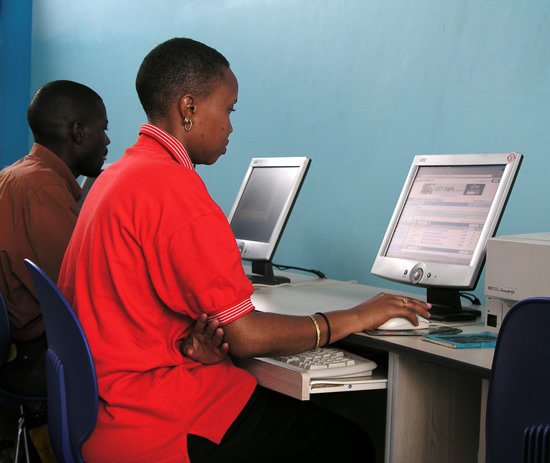 A pilot project in the OR Tambo District Municipality in the Eastern Cape will bring the economic and social benefits of the internet to one of the most under-served communities in the country.
A pilot project in the OR Tambo District Municipality in the Eastern Cape will bring the economic and social benefits of the internet to one of the most under-served communities in the country.
With five separate mostly rural municipalities – King Sabata Dalindyebo, Nyandeni, Mhlontlo, Port St Johns and Ingquza Hill – the OR Tambo District was identified by the Department of Telecommunications and Postal Services as the one most in need of the ICT (information and communications technology) infrastructure that will follow as government rolls out the ambitious digital project of Internet for All.
The project, which is aligned to the National Development Plan and South Africa Connect, aims to provide more than 20 million South Africans, especially those in rural areas, access to the internet by the end of 2020 through new models of public-private collaboration.
Under the pilot project, clinics and schools in the district were the first to be connected to wi-fi infrastructure. According to the spokesperson for the Department of Telecommunications and Postal Services, Siya Qoza, the digital ecosystem has proven to be a hit with the local community. “They have moved on to creating content relevant to their community. The possibilities for safer towns and local business are endless.”
More than the internet
Universal Service and Access Agency of South Africa (USAASA), a state-owned entity, built the infrastructure. By using one of their own entities, the department managed to improve the limited digital infrastructure without the high cost being passed on to the people of OR Tambo District.
In addition, the National Electronic Media Institute of South Africa (NEMISA) will provide ICT skills training to young people in the district. “ICTs are revolutionising communities and economies. NEMISA is here to ensure that these youth can make their own unique contribution.”
Funds from the Eastern Cape Department of Education have allowed district teachers to undergo NEMISA-run ICT courses as well. Qoza explained: “They will go back to the community and share their new skills.”
Across the country
South Africa and Africa’s technology sector is growing but the use of the internet is not. Qoza says Internet for All “is a creative and scalable way to ensure connectivity, especially in rural communities”.
Telecommunications and Postal Services Minister Siyabonga Cwele said that the majority of those who do not have internet connections are women and people living in rural areas and under-serviced municipalities.
The Interet for All programme was unveiled at the World Economic Forum on Africa meeting held in Durban earlier this year. It is a partnership between the department, WEF, business and civil society. “The initiative will rest on four pillars: infrastructure expansion, ICT skills development, affordability and relevant content development, including internet content in our languages,” Minister Cwele said.
The programme was scheduled to begin last year but there were no bidders who could meet government expectations. State entities like SITA (the State Information Technology Agency), Broadband Infraco (BBI) and SENTECH were drafted to implement the project instead.
Broadband Infraco expanded its fibre network to 14 900 kilometres, and this year all entities will spend R416 million to connect 2 700 sites.
Minister Cwele says the department is on track to meet its target of connected South Africans.
Just as important, he believes the infrastructure the government is building will help bring down the cost of data.
“ICASA’s State of ICT Report seems to suggest a lack of competition, particularly by dominant players. The report indicates that data traffic increased by 55 per cent, data revenue increased from R30 to R38 billion and employment decreased by 4 000, yet prices remain sticky at the same level.”
Internet for All will allow the country to reap the benefits of the Fourth Industrial Revolution. The Minister says this is a bold and practical step to reduce the digital divide and stimulate economic activity in rural areas especially.
“With our modest budget and through strategic partnerships, we are on track to meet our ambitious target of ensuring that all South Africans have access to and are utilising the internet for their development.”
Champions of the project include:
Telkom, MTN, Microsoft, Qualcomm, Intel Corporation, Boston Consulting Group, Digital Opportunity Trust, Cisco, DBSA, Neotel/Liquid Telecom, African Development Bank, the United Kingdom Department for International Development, the World Bank, Vodacom, Cell C, Google, Ericsson, Accenture, Altron, the Industrial Development Corporation, SoEs, ICT SMMEs, Research ICT Africa, Ndlovukazi Online Media and WEF Global Shapers.
Entrepreneurs pitch for investment
Entrepreneurs pitch for investment lebangFifteen small, medium and micro-sized enterprises (SMMEs) from across the Free State were recently given an opportunity to showcase their businesses in front of potential private sector investors and government agencies.
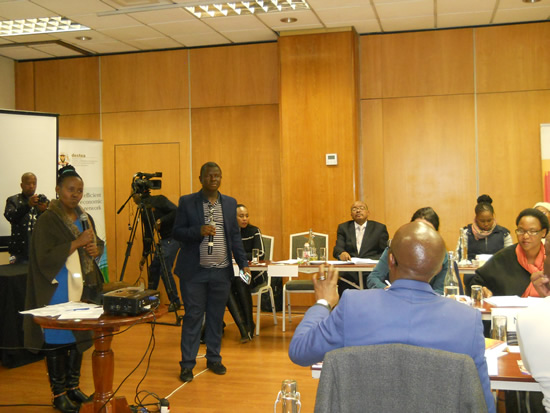 The entrepreneurs, who operate in the agriculture and agro-processing sector, steeled their nerves to market their business in the hope that a member of the audience would see value in their offering. The pitching event came two months after the province held its inaugural agro-processing summit in April.
The entrepreneurs, who operate in the agriculture and agro-processing sector, steeled their nerves to market their business in the hope that a member of the audience would see value in their offering. The pitching event came two months after the province held its inaugural agro-processing summit in April.
The provincial MEC for Economic, Small Business Development, Tourism and Environmental Affairs, Dr Benny Malakoane, said he hoped that as the event was the first of its kind, it would yield positive results and endless possibilities for the entrepreneurs.
“We hope to see a platform of this nature happen every quarter if not more frequently,” said Dr Malakoane.
The entrepreneurs who were given the opportunity to pitch their businesses to potential investors were selected from the department’s database of small businesses and had previously requested funding from the department.
Dr Malakoane spoke firmly against talk shows that don’t yield results while giving some advice to everyone involved in the process. “It doesn’t help to hold a talk shop. Clarity is of importance in the business sector, and investors need to be clear on whether they’ll be able to assist the entrepreneurs or not, and to what extent they will offer assistance,” he said.
“Investors should make it clear whether their assistance will come in the form of money, advice, mentoring or skills transfer,” he added. “Don’t make commitments you can’t fulfill. This is a very serious business and should be treated as such.”
Dr Mbulelo Nokwetu from Free State Development Corporation said one of the criteria for receiving funding was if the business could help curb the unemployment rate in the province, which currently stands at 35 per cent.
Growing jobs, growing businesses
“Funding opportunities will be based on the province’s strategy to create jobs,” he said.
One of the entrepreneurs was Ntsiuoa Kobo from Thitapoho Farm in Tweespruit, who was looking for “support that will help grow the business from where we are currently standing”.
Kobo’s cooperative runs a diversified farming enterprise producing leather products, herbs, essentials oils and vegetables. Thitapoho Farm, according Kobo, uses seasonal labour during the harvesting season.
She spoke of challenges the cooperative faced, “like climate patterns, labour issues and funding”.
Dumisani Mngadi from the South African Bureau of Standards said there was great potential in the SMMEs present. “We are looking at compliance in terms of the products the entrepreneurs produce,” he said.
Tshepo Moremi from the Department of Agriculture, Rural Development and Land Reform was happy to see there were a lot of businesses with the potential to become big role-players in agro-processing.
By the end of the event some potential investors had shown an interest in following up on some of the pitches, requesting contact details or offering skills development.
Economic boost for agricultural cooperatives and training
Economic boost for agricultural cooperatives and training lebangThe Eastern Cape Office of the Premier and the Department of Rural Development and Agrarian Reform (ECRDAR) pledged about R60 million to boost youth-focused agricultural initiatives in the province.
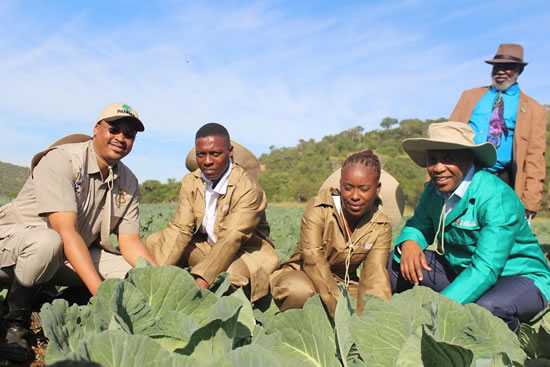 It recently donated various implements, including tractors, to 12 youth-owned agricultural cooperatives.
It recently donated various implements, including tractors, to 12 youth-owned agricultural cooperatives.
The Lower Zingcuka Agricultural Cooperative, which received a complete tractor set, seedlings and fencing, has committed to expanding its crop production business to fight poverty and create more jobs for unemployed locals.
Chairperson Thembekile Hele said the resources will expand the business and increase revenue.
The cooperative produces maize, potatoes, cabbage and butternut, which is sold to shops in East London and King Williams Town, and to locals.
Linking to market
ECRDAR MEC Mlibo Qoboshiyane commended the youth for taking the initiative and creating employment.
The Lower Zingcuka Agricultural Cooperative created jobs for unemployed locals, helping them earn an income, the cooperative’s deputy chairperson Nosiviwe Mayalo said.
“Now that they are linking to markets, government is giving them implements to ensure quality produce. This will create rural wealth and ensure that these rural enterprises are part of the agriculture value chain,” said Qoboshiyane.
Big dreams
The cooperative’s produce will be on retail shelves soon.
“We have big dreams for this project. We started from nothing by planting crops on one hectare of land and we have now grown to nine hectares. Our dream is to start the Lower Zingcuka Agricultural Fruit and Vegetable market,” Mayalo said.
Premier Phumulo Masualle was excited about the project. “It shows that the call we made is being well received, particularly by young people. We had set to make agriculture fashionable, to get young people to see value in participating in agricultural activities. This is one such project, but we have many of them.”
The province is now focusing on training, re-orientating and re-skilling young people and people with disabilities to benefit from the agriculture value chain.
Operation Phakisa gives mussel farm extra muscle
Operation Phakisa gives mussel farm extra muscle lebangOperation Phakisa, run by the Department of Agriculture, Forestry and Fisheries (DAFF), has shelled out the resources needed for a mussel farm in Saldanha Bay to thrive.
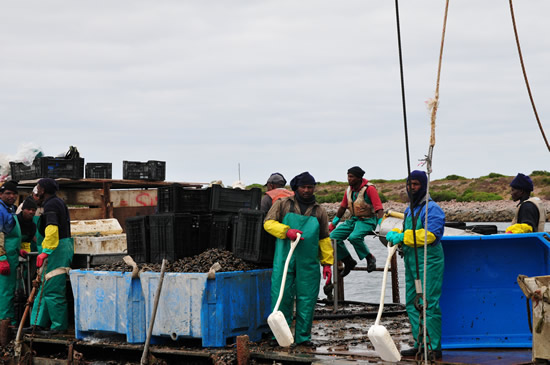 The African Olive Trading mussel farm has grown from a handful of rafts working five hectares of ocean space into an agro-processing business with its own 30-hectare farm.
The African Olive Trading mussel farm has grown from a handful of rafts working five hectares of ocean space into an agro-processing business with its own 30-hectare farm.
The 100 per cent black-owned company can now flex its muscles and break into bigger markets to sell the 500 tons it harvests. With help from the blue economy programme, African Olive Trading and its new entity, Gallo Group, were able to open a processing plant in Velddrif, a small fishing town 90 minutes from Cape Town.
Chairperson of the Gallo Group and GM of African Olive Trading Nolan Adams praised Operation Phakisa for helping to make them the biggest 100 per cent black-owned mussel farm in the country. As a small player, they were unable to process their entire catch and bigger companies with their own factories did not want African Olive’s mussels. Therefore, whatever was not processed or sold fresh went to waste.
Thanks to Operation Phakisa, the company has now entered the agro-processing space. Its new processing plant employs 55 workers. Another eight work the company’s 11 rafts. More importantly, African Olive’s entire catch is sent to Gallo, where it is processed and marketed.
Aquaculture a priority
With help from DAFF, the company accessed grant funding through the Comprehensive Agricultural Support Programme. Adams says the company is looking to add 19 more rafts and a boat by 2019.
The department has taken the lead in helping build this aquaculture project. It is now one of 36 registered Operation Phakisa: Oceans Economy aquaculture projects.
Aquaculture is one of four priority sectors involving the wealth of South Africa’s oceans on which the government is focussing. The others are marine transport and manufacturing, offshore oil and gas exploration, marine protection services and ocean governance.
For 21-year-old Farren Marcus, Operation Phakisa has changed her life. She is a permanent employee at the new processing plant. “This job has made a big difference because I needed the money. I am going start studying next year.”
Black economic empowerment
African Olive Trading is not the only success story in Saldanha Bay. Imbaza Mussels has also benefited from a collaboration between DAFF and the Department of Public Works and the National Ports Authority (TNPA).
Imbaza, a majority BBBEE project, received a 15-year water-space lease from the TNPA and a long-term land lease from Public Works. The company has a packing facility for fresh mussels caught from their five rafts and received funding from the Aquaculture Development and Enhancement Programme run by the Department of Trade and Industry.
Operation Phakisa is about more than just funding companies. An amount of R80 million has been earmarked to rehabilitate small harbours in Gansbaai, Struisbaai, Gordons Bay and Lamberts Bay. The Saldanha Bay harbour will also get a facelift to match the developing industrial base in the town.
Success toasted after grape gamble
Success toasted after grape gamble lebangWhen Vivian Kleynhans decided to go into wine farming in 2005, she transformed her family’s fate.
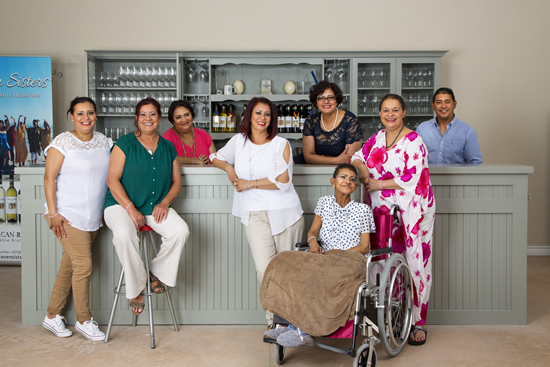 The then Minister of Agriculture had made a request for black people to get involved in the wine industry in the higher value chain and this ticked all Kleynhans’ boxes.
The then Minister of Agriculture had made a request for black people to get involved in the wine industry in the higher value chain and this ticked all Kleynhans’ boxes.
She and her seven siblings were separated when she was a teenager after her father lost his job and they were evicted. “I was looking for a business opportunity that could change our destiny and build a legacy for generations to come,” said Kleynhans.
Thanks to her gamble, the siblings were reunited through fine wines after a separation of 20 years.
It was touch and go for a while, however. Kleynhans said government had established the South African Wine Industry Trust in 1999 with the aim of developing black entrants. However, it was only in 2006 that Kleynhans and 51 other black-owned brands received funding to kick-start their businesses. By then, many – including Kleynhans – were in financial difficulty.
“It was a case of swim or sink; 11 companies [out of the initial 52] remained and worked together as the African Vintners Alliance, now called the Treasure Chest.”
Tenacity, skills and support
They set about equipping themselves with as much industry knowledge as they could. This included attending international wine exhibitions through the Department of Trade and Industry. Kleynhans also enrolled in a Wine Management and Marketing course at the University of Stellenbosch Business School.
The year 2007 was a turning point for Kleynhans. She secured a client in the United States and began exporting her wines. In 2009, her Sauvignon Blanc became the first South African wine to be served on American Airlines in first and business class and a few years later, her brand could be found on the shelves of Walmart stores.
Also in 2009, she and her family were awarded an 8.7 hectare piece of land in Stellenbosch under government’s land reform programme and a grant of R4.8 million through the Land Redistribution for Agricultural Development programme.
Kleynhans, her son and three community members set about transforming the barren land into a fully-fledged wine farm with the help of a mentor appointed by the Department of Agriculture.
She has since added Nigeria, Germany, Canada and China to her growing list of international markets and today African Roots Wines – with its Seven Sisters label – is a global player.
Unemployed EC youth help restore dignity
Unemployed EC youth help restore dignity Estelle GreeffA home-building project leads to young volunteers receiving technical training from the Department of Human Settlements’ Youth Brigade Programme.
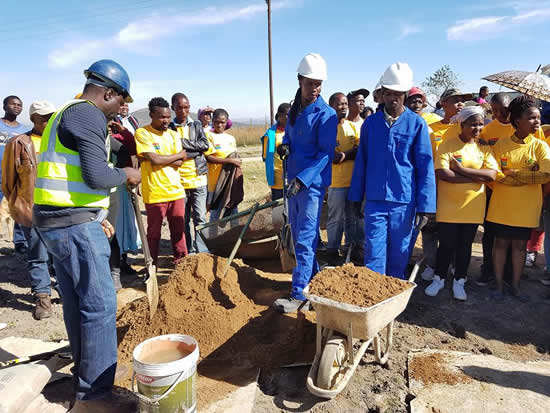 The Eastern Cape MEC for Human Settlements, Helen Sauls-August, handed over 60 newly built homes to families in the villages of Ntabankulu recently. What made the new homeowners even more proud was the fact that their homes were built by formerly unemployed youth from the district.
The Eastern Cape MEC for Human Settlements, Helen Sauls-August, handed over 60 newly built homes to families in the villages of Ntabankulu recently. What made the new homeowners even more proud was the fact that their homes were built by formerly unemployed youth from the district.
A team of 50 spent a month helping construction teams build the new homes. They were then sent for six weeks of technical training as part of the national Department of Human Settlements’ Youth Brigade Programme.
The volunteer programme helps young South Africans to see that construction offers more than just a job pushing bricks in a wheelbarrow. At the end of the six-week technical training the youth will walk away with CETA (Construction Education and Training Authority) certificates in artisan development, employment and enterprise development and professional development.
They follow in the footsteps of 200 unemployed youth from the neighbouring Alfred Nzo District Municipality, who volunteered for the Youth Brigade Build programme and are now skilled builders. The Eastern Cape provincial government will roll out the project across the province.
The spokesperson for the provincial Department of Human Settlements, Lwandile Sicwetsha, says, “The programme is a departmental response to the call of upscaling government interventions for youth development. Youth participate in this programme either as professionals, labourers, entrepreneurs or beneficiaries.”
He added that while the programme is designed to give unemployed youth marketable skills, it has helped the province to address the housing backlog.
Handed over as part of Mandela Month activities, the new homes are white-washed, four-room buildings. The ceremony is, says Sicwetsha, more than just a celebration, it’s about restoring dignity to rural communities like Ntabankulu.
Tinzi chooses hands-on healthcare
Tinzi chooses hands-on healthcare Estelle GreeffA grassroots approach to HIV and TB is making a real difference in an impoverished Western Cape community.
 At age 27, University of Western Cape Nursing Masters graduate Siphokuhle Tinzi has traded an office job as a medical researcher to work for a non-governmental organisation that takes its HIV and TB screening services to the doorstep of poor communities in the Western Cape.
At age 27, University of Western Cape Nursing Masters graduate Siphokuhle Tinzi has traded an office job as a medical researcher to work for a non-governmental organisation that takes its HIV and TB screening services to the doorstep of poor communities in the Western Cape.
After working as a nurse for a primary health care clinic at the City of Cape Town and later as a medical researcher for the Desmond Tutu HIV Foundation, Tinzi decided that working in an office was not for her due to her passion for people on the ground.
She joined the TB/HIV Care Association, which deploys mobile clinics to poor communities in Cape Town and other provinces to test citizens for HIV, sexually-transmitted diseases and to do screening for diabetes and TB, among others.
Tinzi and her team operate in the southern suburbs of Cape Town.
There, the socioeconomic challenges are so great that patients who test positive are often unable to afford to get to clinics for further treatment.
“We took a decision to transport them with our own mobile transport to ensure they get the necessary care.”
Established in 1929 as the Nelspoort After Care Committee during a time when there were no drugs for TB treatment, the TB/HIV Care Association aims to prevent, find and help treat HIV and TB in the most vulnerable communities.
They also offer targeted programmes for inmates, sex workers and people who inject drugs.
Mthatha-born Tinzi’s Masters research focused on the treatment of drug-resistant TB and she intends to use her knowledge one day to influence healthcare policy domestically and internationally.
Tinzi plans to do her PhD degree next year and will then research the possibility of reducing the number of drugs that are currently prescribed to TB patients as they “contribute to a lot of clients not finishing their treatment”.
Youth get food security training from university
Youth get food security training from university Estelle GreeffA number of initiatives are under way in the Eastern Cape to end hunger, achieve food security, improve nutrition and upskill communities.
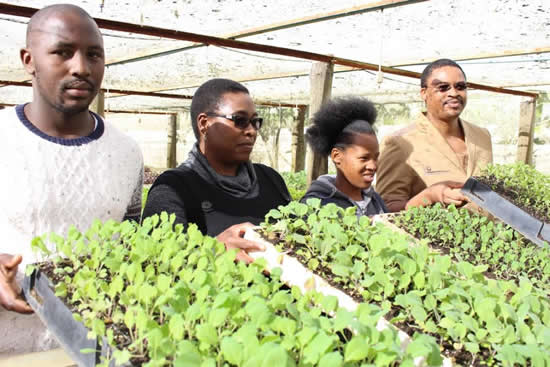 Sixty unemployed young people have been drafted into a crop production pilot programme billed to boost food security for an estimated 300 households and impact hundreds more people.
Sixty unemployed young people have been drafted into a crop production pilot programme billed to boost food security for an estimated 300 households and impact hundreds more people.
As part of the programme, in which the Eastern Cape Department of Rural Development and Agrarian Reform (DRDAR) has invested nearly R2 million, young people are to be trained in a one-year crop production course at the University of Fort Hare.
DRDAR appointed the university to train youth from the poverty-stricken Dyamala, Tyali, Lower Ncera, Upper Ncera and Krwakrwa villages near Alice, equipping them with food garden production techniques.
Government intends to roll out the programme to other poverty-stricken areas.
Hope to change lives
Sinethemba Mangqangqa, 24, said he has been looking for a job since matriculating in 2012. He joined the programme to supplement his aunt’s vegetable-hawking business.
“My mom and aunt are unemployed. They buy vegetables from King Williams Town, which they sell to locals here in Alice. We now want to produce our own vegetables and sell to local people.
“I tried looking for a job to no avail. Through this programme, I will make sure that I focus on my garden to produce vegetables to sell to local buyers,” said Mangqangqa.
Passion for agriculture
Nondwe Galela, 18, who is passionate about agriculture, said being part of this food security programme will empower her with crop production skills to revive her home food garden and create a job for her unemployed father.
“I was attracted to the programme by my passion for agriculture. I want to learn more about food security. No one looks after our home food garden and I will make sure that I look after it,” said Galela.
The University of Fort Hare’s dean of agriculture, Dr Nomakhaya Monde, said the university wants to transform the agriculture landscape in the province by impacting positively on the socioeconomic status of the communities surrounding the university.
“We are happy to be involved in this community initiative so that our students can learn and have that experience,” said Dr Monde. She added that students are also taken into the community to do field work. “It’s a formal kind of community engagement.”
A safety net for communities
Eastern Cape Rural Development MEC Mlibo Qoboshiyane said the programme was a response to the province’s high youth unemployment numbers. According to a Statistics SA report, the provincial youth unemployment rate is 41 per cent; 55 per cent of these do not have matric.
The department has invested about R1.9 million into the programme for registration and tuition fees, and payment of stipends to all participating youth for the duration of the programme.
Qoboshiyane said the department wanted to empower young people to be active in eradicating poverty in their rural communities.
“We realise that the scourge of poverty is a problem in the Eastern Cape. We are going to ensure that we help young people with production inputs,” he said. The training would result in a recognised qualification at NQF 4 level.
Partnering with UFH students
Qoboshiyane said young people will partner with University of Fort Hare students and each group would be linked to five households, a school and a clinic or community garden. It is estimated that about 300 local households will benefit from the programme before it is rolled out to other areas.
The MEC said that other learnerships are in place to train young people in both crop and animal production.
In addition, the department is establishing a rural wealth-creation centre to benefit unemployed agriculture graduates at Fort Cox College. It will help empower young people to be self-reliant.
One Household, One Hectare programme on track
One Household, One Hectare programme on track Estelle GreeffThe One Household, One Hectare programme is about creating viable small to medium rural agricultural enterprises – and about restoring dignity.
Since it was launched nearly two years ago, the One Household, One Hectare programme has benefitted thousands of households across the country.
Driven by the Department of Rural Development and Land Reform, the programme’s aim is to eradicate poverty and create a class of black smallholder farmers, producers and agro-manufacturers.
In a recent parliamentary briefing by the department, it was stressed that the One Household, One Hectare initiative is important for job creation and inclusive growth in agriculture. It will also help government achieve equity in land ownership, access and tenure security.
So far, 6 683 households from 182 sites across the country have benefitted from the department’s various initiatives. About 10 500 households are expected to benefit from the One Household, One Hectare programme alone.
It should help reduce poverty, create sustainable employment in rural households, build rural people’s competencies and broaden the skills base of targeted households and communities while creating viable small to medium rural agricultural enterprises.
Millions in funding
The department set aside R100 million for the first year of the programme through its Recapitalisation and Development Budget.
When the Minister of Rural Development and Land Reform, Gugile Nkwinti, handed over 14 hectares of land to the first recipients of the programme at Kenton-on-Sea’s Gorah Agribusiness and Multipurpose Cooperative in 2015, he said his aim was to bring back the dignity of people living in rural areas and transform the rural economy.
Since then, the cooperative – based in the Eastern Cape’s Ndlambe Local Municipality – has managed to secure contracts with Pick n Pay and a Port Elizabeth fruit and vegetable market to sell its produce at the local outlets.
The minister also dicovered during a site inspection last year that the community intends to invest 20 per cent back into the farm and diversify into livestock.
He was pleasantly surprised to find that the beneficiaries were harvesting crops of potatoes and pumpkin even though the country had been experiencing a severe drought.
All the beneficiaries of the One Household, One Hectare programme receive a certificate to be used as collateral or surety if they want the bank to help them. However, neither the land nor the certificate can be sold because the land belongs to the state.
Toilet paper factory launched in rural EC
Toilet paper factory launched in rural EC Estelle GreeffSiblings shatter perceptions about rural economies by establishing a thriving toilet paper factory in a small Eastern Cape village.
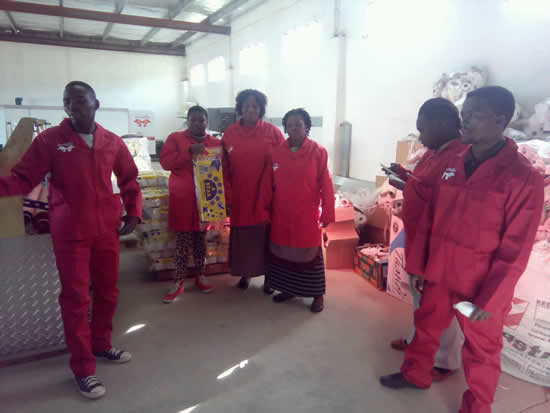 Tankiso Mosie, 24, is the proud co-founder of Red Ribbon, a toilet paper brand he started at the age of 19 when freshly graduated from a vocational training institution.
Tankiso Mosie, 24, is the proud co-founder of Red Ribbon, a toilet paper brand he started at the age of 19 when freshly graduated from a vocational training institution.
Mosie was earning a living through informal trading but was determined to find a sustainable business idea that would be his ticket into the formal economy. He hit on toilet paper because it is a necessity in every household.
He and his sister Matisetso Mosie started their business from a garage in their home in 2014.
Today, Red Ribbon has 14 employees and a factory that manufactures 10 000 toilet rolls a day.
At the recent launch of their factory, situated near King Williams Town in the rural Eastern Cape, MEC for Economic Development Sakhumzi Somyo commended the young founders of the company for their initiative, which he said would help develop the economy of the village.
The siblings’ hard work paid off when they got over R2.5 million from the Eastern Cape Department of Economic Development and Environmental Affairs (DEDEAT) through the local and Regional Economic Development Fund. The cash was used to build the manufacturing facility and buy equipment and a vehicle.
The Small Enterprise Development Agency (Seda) helped with branding and buying some of the machines while the National Youth Development Agency (NYDA) helped with computers.
“Initially, there were five of us including my sister and three employees. We started working from home. Now we have 14 employees and 10 of them are full time. We supply Nicks Food SuperSpar in King Williams Town and Georgious SuperSpar in Alice and Fort Beaufort. Weirs Cash & Carry has shown interest and we have also approached Pick n Pay,” said Mosie.
Red Ribbon manufactures various ranges from recycled to virgin single-ply and double-ply. “We have the capacity to produce 30 000 toilet rolls a day,” said Mosie, adding that his immediate goal was to grow the business.
Apart from the DEDEAT grant, Red Ribbon received R48 000 from the NYDA, while the support from Seda was of a non-financial kind.
Calls to support light manufacturing
Speaking at the launch of the factory, Somyo called on government and communities in the Eastern Cape to support locally-manufactured brands. He commended the founders of the company for changing the economic face of their village.
“Nowhere in our province have we heard of a factory opening in a rural village employing people from the rural communities. We have a product we can call our own and all of us should support this initiative. Somyo said the LRED Fund was focused on involving local people in the development of their local economies through opportunities for economic growth and employment creation.
He said Mosie siblings broke barriers because by starting Red Ribbon in a rural area, they have changed perceptions of rural people about the economies of their areas.
“Red Ribbon has been started in a village by young people who dared to dream big in sectors where others have failed and for that we salute their resolve and determination. Their efforts have effectively taken 14 members of this community out of unemployment and poverty,” Somyo said.
Operation Vula a boost to small business
Operation Vula a boost to small business Estelle GreeffSmall-scale farmers and small business have been given a shot in the arm by a newly launched programme in KwaZulu-Natal. Operation Vula will boost local economies through the buying power of the provincial government.
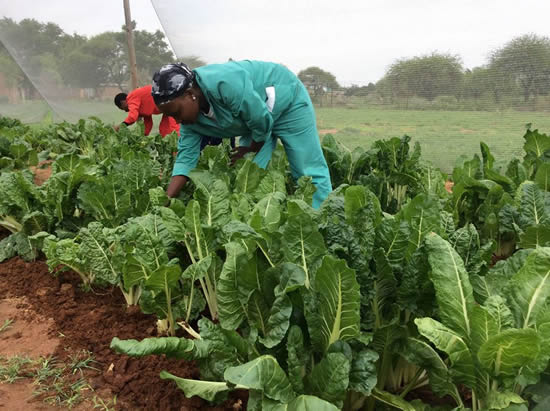 The programme will enable cooperatives and SMMEs owned by women, youth and people with disabilities to become preferred suppliers.
The programme will enable cooperatives and SMMEs owned by women, youth and people with disabilities to become preferred suppliers.
It will also allow them to access funding for skills training and marketing.
At the recent launch in Ixobho, KwaZulu-Natal Premier Willies Mchunu described the programme as a way to build a prosperous and equal society through opportunity. It was now up to residents to make use of the chance.
“With us guaranteeing markets, we are convinced that black and African farmers, in particular, will have enough incentive to enter this sector.”
Radical transformation
While Operation Vula will target the furniture manufacturing, bakery and clothing and textile sectors, its subsidiary, Radical Agrarian Socio-Economic Transformation, seeks to increase the number of small-scale farmers from underprivileged communities entering the lucrative food production sector.
Both programmes will be run by the provincial Department of Economic Development, Tourism and Environmental Affairs under the direction of MEC Sihle Zikalala. The MEC explained that the empowerment initiative is meant to address rural unemployment and development.
The MEC said the province was forced to spend its R2.2 billion food procurement budgets with established companies. To benefit from this policy, small-scale farmers and SMMEs need to contact their nearest agricultural office to be registered on the supplier database.
The province will prioritise African farmers and SMMEs, but the MEC warned that these programmes are not handouts. “What we mean to achieve with this programme is to empower black and African farmers and ensure that they play in the mainstream of this sector. The aim of the Radical Agrarian Socio-Economic Transformation programme is to grow the agricultural sector, through ensuring participation by those who were previously marginalised and ensuring that they benefit equitably from this sector.”
Jobs: Social Development - Jul 2017 (2)
Jobs: Social Development - Jul 2017 (2) Estelle GreeffSenior Management Service
Director-General: Social Development
Reference number: M2/A/2017 (Five-year fixed term contract)
Total cost-to-employer package: R1,689,750 p.a. plus a 10% non pensionable HoD allowance. This inclusive remuneration package consists of a basic salary, the states’ contribution to the Government Employees Pension Fund and a flexible portion that may be structured i.t.o. the applicable rules. The successful candidate will be required to enter into a performance agreement, sign an employment contract and disclose her/his financial interest within one month of appointment and thereafter on an annual basis.
Centre: Pretoria, HSRC Building.
Requirements: An undergraduate qualification (NQF level 7) and a Post graduate qualification (NQF level 8) as recognised by SAQA plus 8 – 10 years of experience at senior managerial level of which at least 3 years experience must be within any organ of State as defined in the Constitution, Act 108 of 1996. Knowledge of the Public Service Legislation. Knowledge and understanding of the relevant legal framework. Competencies needed: Strategic capability and leadership. Programme and project management. People management and empowerment. Financial management. Change management. Knowledge management. Service delivery innovation. Problem-solving and analysis. Client orientation and customer focus. Communication. Project management. Attributes: Ability to initiate and support organisational transformation and change. Ability to explore and implement new ways of delivering service. Ability to provide vision, set organisational direction and inspire others to deliver on the organisational mandate. Ability to work together with civil society, business, academia and the international community.
Duties: Oversee the provision and implementation of intergovernmental relations, executive support and special project services, comprehensive social security, non-profitable organisations regulatory services, families and social welfare, community development programmes, social crime prevention, social policy and research, corporate, financial and strategy services, social policy and research programmes as well as rights to people with disabilities services. Oversee the facilitation of the translation of national and international obligations into empowerment and socio-economic development programmes towards the realization of rights of people with disabilities and equalization of opportunities. Ensure that policies and legislation are drafted to achieve the strategic priorities set by the Minister of Social Development for the Social Development sector. Ensure that the necessary systems, procedures and capacity are in place for implementation of priorities and attainment of outcomes. Develop effective strategies for the implementation of priorities and attainment of government outcome 13. Provide support to the Provincial Departments, Non-Governmental Organisations, community-based organisations with the implementation of strategies and programmes and other outcomes related to Department of Social Development. Advise the Minister of Social Development on a range of budgetary matters pertaining to the social development sector. Manage communication and dissemination of information on the social development sector. Oversee the effective management and administration of entities reporting to the Minister. Provide technical support to Minister at meetings, including MINMEC, through preparation of briefing notes and inputs from the Department. Prepare an annual report and accounts for submission to Minister and Parliament.
Note: In terms of the Department’s employment equity target, African, Coloured and White males and African, Coloured and Indian females as well as persons with disabilities are encouraged to apply.
Enquiries: Mr D Chinappan, Tel no: 012 312 7504
Deputy Director-General: Comprehensive Social Security
Reference number: M2/B/2017
Total cost-to-employer package : R1 299 501 per annum This inclusive remuneration package consists of a basic salary, the states’ contribution to the Government Employees Pension Fund and a flexible portion that may be structured i.t.o. the applicable rules.
Centre : Harlequins Office Park, Groenkloof
Requirements: An appropriate Bachelor’s Degree or equivalent qualification (NQF level 7) and a post graduate qualification (NQF level 8) as recognised by SAQA PLUS a minimum of 8 to 10 years of relevant experience at a senior managerial level. Knowledge of the relevant Public Service Regulatory Framework. Knowledge of acts governing the implementation of social development services and programmes. Understanding and knowledge of comprehensive social security and the legislative framework, systems, processes and programmes. Competencies: Strategic capability and leadership skills. Programme and project management skills. Financial management skills. Policy analysis and development skills. Information and knowledge management skills. Communication (written and verbal) skills. Service delivery innovation skills. Problem-solving and change management skills. People management and empowerment skills. Client orientation and customer focus skills. Stakeholder management skills. Presentation, facilitation and coordination skills. Attributes: Good interpersonal relations. Ability to work under pressure. Innovative and creative. Independent thinker. Ability to work in a team and independently. Cultural sensitivity. Adaptability. Confidentiality. Political sensitivity. Diplomatic. Cost consciousness. Honesty and integrity.
Duties: Manage and provide leadership in the review and development of comprehensive social security (Social insurance, social security, appeals and inspectorate) legislative, regulatory and compliance frameworks. Manage the operations of the Inspectorate for Social Assistance and the development of the appropriate institutional form and relevant frameworks. Manage the provisioning of social security budgeting, modelling and forecasting services. Manage and coordinate the implementation of the social security reform programmes. Manage the operations of social assistance appeals. Provide advice and guidance to the social development sector, cluster and participate in various fora in relation to comprehensive social security.
Note: In terms of the Department’s employment equity target, African, Coloured and White males and African, Coloured and Indian females as well as persons with disabilities are encouraged to apply.
Enquiries: Mr D Chinappan, Tel no: 012 312 7504
Chief Director: Internal Audit Services
Reference number: M2/C/2017
Chief Directorate: Internal Audit Services
Total package: R1 068 564 per annum This inclusive remuneration package consists of a basic salary, the states’ contribution to the Government Employees Pension Fund and a flexible portion that may be structured i.t.o. the applicable rules.
Centre: Pretoria, HSRC Building
Requirements: An undergraduate or equivalent qualification in Internal Audit/Auditing (NQF level 7) as recognised by SAQA PLUS five years senior management experience in internal auditing Registration with the Institute of Internal Auditors. Certified Internal Auditor (CIA) will be an added advantage. Knowledge of the relevant Public Service Legislation. Knowledge and understanding of accounting practices and public sector reporting requirements. Knowledge and understanding of internal audit and risk management principles and practices. Knowledge and understanding of legal compliance, good governance and financial management. Knowledge and understanding of the standards set by the Institute of Internal Auditors (IIA) incorporated. Knowledge in the use of Computer Assisted Audit Techniques (CAATS). Knowledge of corporate governance. Knowledge and understanding of General Acceptance Accounting Practice (GAAP). Knowledge and understanding of International Financial Reporting Standards (IFRS). Competencies needed: Strategic capability and leadership. Programme and project management skills. Planning and organising skills. Communication (written and verbal) skills. Policy analysis and development skills. Financial management skills. People management and empowerment skills. Client orientation and customer focus skills. Service delivery innovation skills. Monitoring and evaluation skills. Change Management skills. Knowledge Management skills. Negotiation, problem-solving and analysis skills. Stakeholder management skills. Facilitation and coordination skills. Attributes: Good interpersonal relations. Ability to work under pressure. Ability to work in a team and independently. Adaptive. Honesty and Integrity. Innovative and creative. Independent thinker. Cost consciousness. Business ethics.
Duties: Provide leadership in the development and implementation of audit policies, strategy and plans, methodologies and procedures in line with the Institute of Internal Auditors (IIA) and relevant public service legislation. Manage the provision of internal audit services to ensure the attainment of the overall strategic objectives through the adequacy and effectiveness of internal controls, governance processes, performance, financial, information systems and forensic audits, quality assurance and compliance with prescripts and professional ethics. Provide technical and secretariat support to the Audit Committee to enable the Committee to meet its objectives. Manage the assessment on the implementation of audit recommendations and the impact of the corrective action taken by management on the deficiencies identified by the audits. Provide advice to the Director-General on the adequacy and effectiveness of internal systems, controls and processes. Report the outcomes of the Internal Audit activities, including the implementation of audit recommendations, to the Director-General, Executive Committee (EXCO) and the Audit Committee. Provide advice and support to the department’s entities on internal audit matters. Keep abreast of global trends and best practices in the internal audit environment and facilitate continued staff development. Provide advice and guidance on internal audit matters to the social development sector and participate in various fora in relation to internal audit activities. Ensure that the financial and physical capacity requirements of the Chief Directorates adequately reflect operational realities in accordance with the Department’s priorities and policies.
Note: In terms of the Department’s employment equity targets, African, Coloured and White males and African, Coloured and Indian females as well as persons with disabilities are encouraged to apply.
Enquiries: Mr D Chinappan, Tel no: 012 312 7504
Director: Labour Relations
Reference number: M2/D/2017
Chief Directorate: Human Capital Management
Total cost-to employer package: R898 743.00 p.a. This inclusive remuneration package consists of a basic salary, the states’ contribution to the Government Employees Pension Fund and a flexible portion that may be structured i.t.o. the applicable rules.
Centre: HSRC Building, Pretoria
Requirements: A relevant Bachelor’s Degree or equivalent qualification (NQF level 7) as recognised by SAQA PLUS five years middle/senior management experience in the Collective Bargaining/ Labour Relations field. Knowledge of the relevant Public Service legislation. Knowledge and experience in developing, implementing and reviewing relevant labour relations policies and procedures. Knowledge of dispute resolution and the CCMA process. Knowledge of and experience in working with a bargaining council. Proven conflict management skills and experience. Competencies needed: Strategic capability and leadership. Programme and project management. Financial management. Policy analysis and development. Information and Knowledge management. Communication (written, verbal and liaison). Computer Literacy. Negotiation. Service delivery innovation. Problem-solving and change management. People management and empowerment. Client orientation and customer focus. Stakeholder management. Presentation and facilitation. Attributes: Good interpersonal relationship. Ability to work under pressure. Innovative and creative. Ability to work in a team and independently. Adaptability. Diplomatic. Independent thinker. Cost consciousness. Honesty and Integrity.
Duties: Manage the development and implementation of departmental employee relations policies and guidelines. Provide strategic employee relations direction and advice to line functionaries and top management. Manage the provisioning of conflict management, labour dispute resolution and collective bargaining services. Design, present and evaluate training interventions with regard to labour relations issues for all labour relations role-players. Implement labour relations communication strategies aimed at creating awareness and/or seeking acknowledgement
Note: In terms of the Chief Directorate’s employment equity targets, African males and females, Coloured females as well as persons with disabilities are encouraged to apply.
Enquiries: Mr D Chinappan, Tel no: (012) 312-7504
Applications: The Director General, Department of Social Development, Private Bag X901, Pretoria, 0001, Physical Address: HSRC Building, 134 Pretorius Street
For attention: Ms E Steenkamp
Closing date: 28 July 2017
Note: Curriculum vitae with a detailed description of duties, the names of two referees and certified copies of qualifications and identity document must accompany your signed application for employment (Z83). In the event of hand delivery of applications, applicants must sign an application register book as proof of submission. All shortlisted candidates for SMS posts will be subjected to a technical exercise that intends to test relevant technical elements of the job, the logistics of which will be communicated by the Department. Following the interview and technical exercise, the selection panel will recommend candidates to attend a generic managerial competency assessment (in compliance with the DPSA Directive on the implementation of competency based assessments). The competency assessment will be testing generic managerial competencies using the mandated DPSA SMS competency assessment tools. The successful candidate will sign an annual performance agreement, complete a financial discloser form and will also be required to undergo a security clearance. If the candidate is applying for an OSD post, certificates of service must be attached to the CV. It is the applicant’s responsibility to have foreign qualifications evaluated by the South African Qualification Authority (SAQA). Failure to submit the requested documents will result in your application not being considered. Personnel suitability checks will be conducted on short listed candidates and the appointment is subject to positive outcomes of the checks. Correspondence will be limited to shortlisted candidates only. The selection of candidates will be done with due regard to the relevant aspects of the selection process as set out in the Public Service Regulations, 2016 Chapter 4/67. Applications received after the closing date will not be taken into consideration. No faxed or e-mailed applications will be considered. If you have not been contacted within three months after the closing date of this advertisement, please accept that your application was unsuccessful.
Jobs: Labour Jul 2017
Jobs: Labour Jul 2017 Estelle GreeffAssistant Director: COIDA (3 posts)
Centres: Labour Centre Rustenburg, Labour Centre Klerksdorp, Provincial Office Mmabatho
Reference No: HR 4/4/9/230
Salary: Commencing: R334 545 per annum
Enquiries: Mr OPS Sebapatso, Tel: 018 387 8195
Applications: Chief Director: Provincial Operations, Department of Labour, North West, Private Bag X2040, Mmabatho, 2735
Principal Inspector: Employment Equity
Centre: Provincial Office Braamfontein
Reference No: HR 4/4/4/06/28
Salary: Commencing: R 417 552 per annum
Enquiries: Mr L Bleni, Tel: 012 309 5253
Applications: Chief Director: Provincial Operations, Department of Labour, Gauteng, PO Box 4560, Johannesburg, 2000
Deputy Director: Research Policy and Planning
Centre: Branch: Labour Policy and Industrial Relations, Head Office
Reference No: HR 4/17/07/02 HO
Salary: All inclusive: R 779 295 per annum
Enquiries: Mr S Molapo, Tel: 012 309 4167
NB: All shortlisted candidates will be subjected to a technical competency test that intends to test the relevant technical elements of the post.
Deputy Director: Management and Support Services
Centre: Provincial Office Limpopo
Reference No: HR 4/4/6/86
Salary: All inclusive: R657 558 per annum
Enquiries: Ms TE Maluleke, Tel: 015 290 1625
Applications: Chief Director: Provincial Operations: Limpopo, Department of Labour, Private Bag X9368, Polokwane
Assistant Director: Public Employment Services
Centre: Provincial Office KwaZulu-Natal
Reference No: HR 4/4/5/49
Salary: Commencing: R 417 552 per annum
Enquiries: Mrs D Mlaba, Tel: 031 366 2010
Applications: Chief Director: Provincial Operations: KwaZulu-Natal, Department of Labour, PO Box 940, Durban, 4000
Assistant Director: Tender Administration
Centre: Chief Directorate: Financial Management, Head Office
Reference No: HR 4/17/07/01HO
Salary: Commencing: R334 545 per annum
Enquiries: Ms K Maholwana, Tel: 012 309 4670
Applications: Chief Director: Human Resources Management, Department of labour, Private Bag X117, Pretoria, 0001 or hand deliver to Laboria House, 215 Francis Baard Street, Pretoria
Closing date for applications: Monday, 31 July 2017 at 16:00
For full detilas of the advertised posts visit our website www.labour.gov.za
Applications must be submitted on form Z83, obtainable from any Public Service Department or on the internet at www.gov.za/documents. The fully completed and signed form Z83 should be accompanied by a recently updated, comprehensive CV as well as recently certified copies of all qualification(s) including a Senior Certificate and ID-document [Driver’s license where applicable]. Non-RSA Citizens/Permanent Resident Permit Holders must attach a copy of their Permanent Residence Permits to their applications. Should you be in possession of a foreign qualification, it must be accompanied by an evaluation certificate from the South African Qualification Authority (SAQA). Applicants who do not comply with the above-mentioned requirements, as well as applications received late, will not be considered. The Department does not accept applications via fax or email. Failure to submit all the requested documents will result in the application not being considered. Correspondence will be limited to short-listed candidates only. If you have not been contacted within eight (8) weeks after the closing date of this advertisement, please accept that your application was unsuccessful. Suitable candidates will be subjected to a personnel suitability check (criminal record, citizenship, credit record checks, qualification verification and employment verification). Where applicable, candidates will be subjected to a skills/knowledge test. All shortlisted candidates for SMS posts will be subjected to a technical competency exercise that intends to test relevant technical elements of the job, the logistics of which be communicated by the Department. Following the interview and technical exercise, the selection panel will recommend candidates to attend generic managerial competencies using the mandated DPSA SMS competency assessment tools. Successful candidates will be appointed on a probation period of 12 months. The Department reserves the right not to make any appointment(s) to the above post. The successful candidate will be expected to sign a performance agreement. The Department of Labour is an equal opportunity affirmative action employer. The employment decision shall be informed by the Employment Equity Plan of the Department. It is the Department’s intention to promote equity (race, gender and disability) through the filling of this post(s) with a candidate whose transfer / promotion / appointment will promote
representativity in line with the numerical targets as contained in our Employment Equity Plan.
Draft regulations to phase-out the use of persistent organic pollutants
Draft regulations to phase-out the use of persistent organic pollutants Estelle GreeffNational Environmental Management Act, 1998 (Act No 107 of 1998)
I, Bomo Edith Edna Molewa, Minister of Environmental Affairs, hereby give notice of my intention to make regulations to phase-out the use of Persistent Organic Pollutants, under Section 44(1)(aA), read with Section 47 of the National Environmental Management Act, 1998 (Act No 107 of 1998).
The country is a party to an International Convention (Stockholm Convention) on Persistent Organic Pollutants which is a global treaty that protects human health and the environment from chemicals that remain intact in the environment for long periods, become widely distributed geographically, accumulate in the fatty tissue of humans and wildlife, and have harmful impacts on human health and environment. The Stockholm Convention obliges party countries to ban the use of certain persistent organic pollutants listed for elimination by the Conference of Parties convened by the Secretariat every second year. The Department of Environmental Affairs is a Designated National Authority responsible for the implementation of the provisions of the Stockholm Convention.
The overall intention of the draft regulations is to set out the requirements for the phase-out of listed Persistent Organic Pollutants, through setting out the timeframes in which users, producers, importers and exporters must have completely phased-out listed Persistent Organic Pollutants and should also state when safer alternatives to listed Persistent Organic Pollutants will be introduced.
Members of the public are invited to submit to the Minister, within 60 days of publication of this notice in the Gazette, written representations or objections to the following addresses: By post to: The Director-General, Department of Environmental Affairs, Attention: Mrs Salome Margaret Molefe, Private Bag X447, Pretoria 0001
By hand at: Environment House (Reception), 473 Steve Biko Street, Pretoria, Arcadia 0082
By e-mail: SMolefe@environment.gov.za
Any enquiries relating to this notice may be forwarded to Mrs Salome Margaret Molefe at (012) 399-9845.
Comments received after the closing date may not be considered.
SA companies spot business opportunities in East Africa
SA companies spot business opportunities in East Africa Estelle GreeffInternational relations / Africa news
A recent Department of Trade and Industry mission to East Africa has helped put South African exporters in contact with exciting new markets.
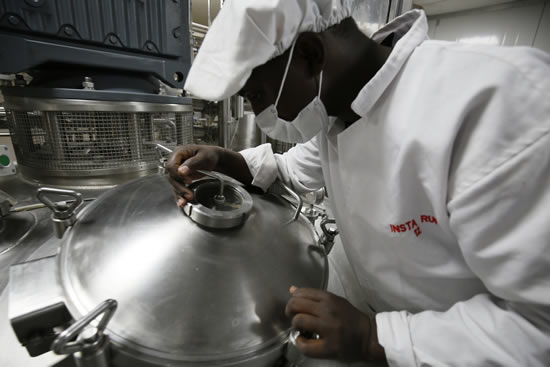 Representatives from 27 South African businesses accompanied the Department of Trade and Industry (the dti) on its Outward Selling Mission to East Africa at the end of June.
Representatives from 27 South African businesses accompanied the Department of Trade and Industry (the dti) on its Outward Selling Mission to East Africa at the end of June.
The mission visited Nairobi, Kenya, and Dar es Salaam, Tanzania.
The delegation held meetings with local business owners and government officials. Tanzanian companies were interested in starting dialogues with companies involved in Operation Phakisa.
After the visit, the dti’s chief director of export promotion and marketing, Zanele Sanni, said: “The marine economy-focused Operation Phakisa is going to unlock opportunities in the shipping, fisheries, aquaculture, mining, oil and gas, bio-technology and tourism sectors and the Tanzanian private sector is enthusiastic about these opportunities.”
Build on opportunities
Sanni said the connections made on the mission were just the beginning. “We hope that in six months we will be able to report on tangible transactions as a result of the mission.”
Gertrude Makamure, MD of Tarch Chemicals, believes her talks with Kenyan companies will lead to new business for her Gauteng company. “I have noticed that a lot of material can be supplied by South African companies here, particularly chemicals and related ingredients, at a much cheaper rate than is being currently supplied.”
Beyond finding opportunities, the dti missions give South African businesses insight into the markets they are trying to crack. Afro Botanics manufactures hair and body treatments using essential oils and natural ingredients, and has tried unsuccessfully to gain a foothold in Kenya.
CEO Ntombenhle Khathwana says Kenya’s fast-growing natural hair movement, where women are choosing to stop chemically straightening their hair, is an untapped market for her products. “I came to Kenya to understand the Kenyan market better, from a regulatory business perspective as well as from a consumer perspective.”
She believes Kenya will soon become her sixth African market.
Beyond the private sector
The dti is also eager for African countries to look at South Africa as a destination for investment. The Tanzanian interest in Operation Phakisa presents an opportunity for them to partner with South African state-owned enterprises (SOEs).
As the dti’s Sanni pointed out, “SOEs are keen to partner and work with other African economies with a view to prioritise investment in marine manufacturing, boat building as well as oil rig maintenance and repair.”
This month in history - Jul 2017 (2)
This month in history - Jul 2017 (2) Estelle GreeffInternational relations / Africa news
Nelson Mandela is born 18 July 1918
Nelson Rolihlahla Mandela was born on 18 July 1918 in the small village of Mvezo, in the district of Qunu near Umtata, Transkei (now known as Eastern Cape).
Mandela became involved in politics while a student at Fort Hare University after he met Oliver Tambo, who became his life-long friend.
In 2009, the United Nations, declared 18 July as Nelson Mandela International Day, to be celebrated annually. It was first celebrated in 2010.
On 12 June 1964 Mandela was sentenced to life in prison on Robben Island. From Robben Island he was transferred to Pollsmoor prison and then Victor Verster prison before he was released in 1990.
Mandela was elected president of South Africa in 1994.
In 1999, at the end of his first term in office, he voluntarily stepped down.
Source: South African History Online – www.sahistory.org.za
SA-DRC: A decade of cooperation
SA-DRC: A decade of cooperation Estelle GreeffInternational relations / Africa news
The recently concluded 10th Binational Commission (BNC) between South Africa and the Democratic Republic of the Congo (DRC) helped to further strengthen ties between the two countries.
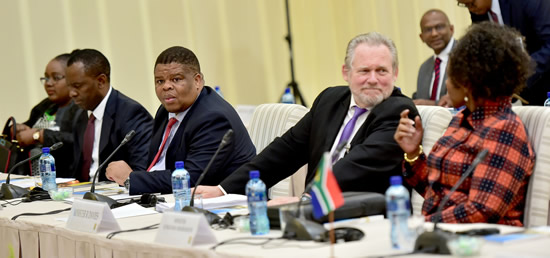 Presidents Joseph Kabila and Jacob Zuma agreed to work towards removing all obstacles blocking free trade and investment between the countries. The agreement comes after a decade of South African assistance in building the DRC’s diplomatic corps, helping to train its army and police and providing assistance to run its elections.
Presidents Joseph Kabila and Jacob Zuma agreed to work towards removing all obstacles blocking free trade and investment between the countries. The agreement comes after a decade of South African assistance in building the DRC’s diplomatic corps, helping to train its army and police and providing assistance to run its elections.
Free trade
Both heads of state believe that trade between the countries should be developed. They have set their trade negotiators the task of looking at a speedy implementation of the Treaty on the Avoidance of Double Taxation.
The BNC was also the forum for the signing of the Memorandum of Understanding between the Cross Border Road Transport Agency and the Office for the Management of Multimodal Freight.
The agreement makes it easier for freight to move between the two countries by, in some cases, lowering tariffs.
President Zuma says South Africa will continue offering assistance to the DRC.
President Kabila said the BNC would look into the biggest stumbling block to cooperation.
“What has been hindering a lot of progress, I believe, is the fact that there’s quite a lot of bureaucracy that we need to do away with.”
President Kabila also spoke about energy, an important sector for the DRC.
By harnessing the power of the Congo River, the Grand Inga project has the potential to power half the continent. Both presidents agreed that the project is important for economic development and continent-wide electrification.
Arts Incubator lifts curtain on local talent
Arts Incubator lifts curtain on local talent Estelle GreeffSport, arts and culture
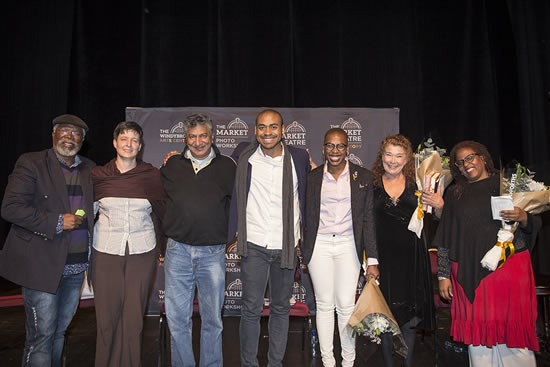 There were calls for an encore when six state-funded Performing Arts Institutions took centre stage recently and showcased the products of their development programmes.
There were calls for an encore when six state-funded Performing Arts Institutions took centre stage recently and showcased the products of their development programmes.
Two years of creativity and hard work were celebrated at the Market Theatre in Johannesburg recently at the inaugural Arts Incubator Trade Fair.
The week-long celebration of the best locally created poetry, dance and theatre is the result of two years of funding by the Department of Arts and Culture’s Incubator Fund to the country’s six Performing Arts Institutions (PAIS).
Actor John Kani said the success of the fair showed the untapped talent in South Africa. He hoped the department would continue to invest in opportunities for them. Monica Newton, the department’s Deputy-Director General, responded, “In this week, you have shown what is possible.”
 The Market Theatre’s CEO, Ismail Mahomed, told media the fair allowed the Performing Arts Institutions to share ideas on skills training and development programmes. More importantly, he added, it would, “ catapult the careers of their incubatees into the wider arts economy”.
The Market Theatre’s CEO, Ismail Mahomed, told media the fair allowed the Performing Arts Institutions to share ideas on skills training and development programmes. More importantly, he added, it would, “ catapult the careers of their incubatees into the wider arts economy”.
Incubator grants, part of the national department’s mission to create an inclusive cultural scene, allowed PAIs the freedom to run programmes without worrying about sourcing funding. The productions on show were workshopped, scripted and brought to stage under the guidance of legendary playwrights like Ronnie Govender.
Performers and administrators all expressed one hope at the end of the festival, that the event was the first of many to come. As Mahomed said, “I trust that the artistic bonds that we have forged this week will be the seeds for a forest to grow.”
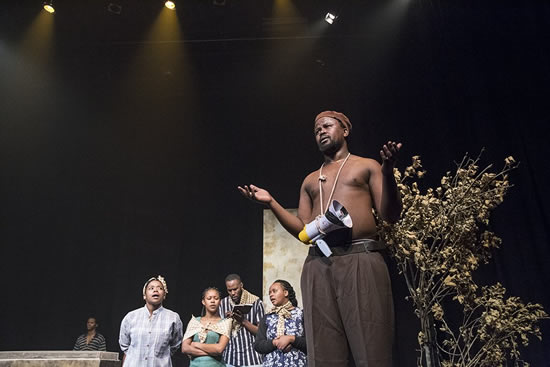 The nine productions were also in competition. Winners were announced on the last evening:
The nine productions were also in competition. Winners were announced on the last evening:
- Best script: Everyone Has It produced by Artscape
- Best director: Luthando Mngomezulu for Isithunzi produced by the Market Theatre
- Best performer (male): Dumisani Siziba in Everyone Has It produced by Artscape
- Best performer (female): Boitumelo Mohutsioa and Saree van Coppenhagen (joint winners) in Steke produced by Pacofs
- Best stage manager: Simphiwe Mdi for Gogoa Mamoya produced by Pacofs
- Best choreography: Sandile Mkhize for If the World Was Listening produced by the Playhouse Company
- Best design: Gogoa Mamoya produced by Pacofs
- Best production: Isithunzi produced by the Market Theatre